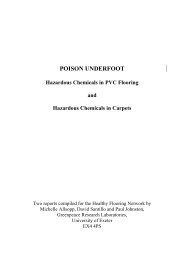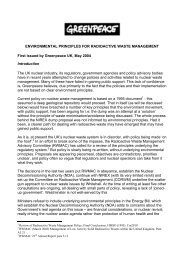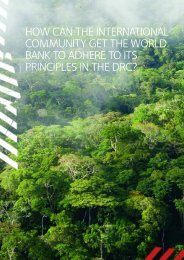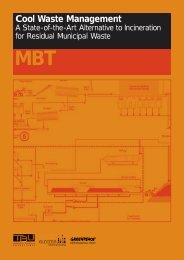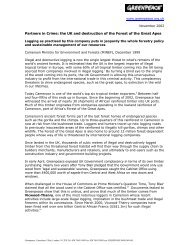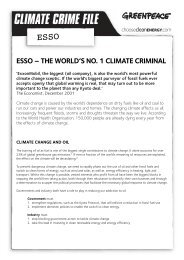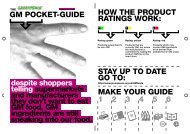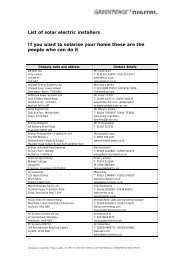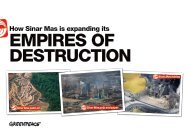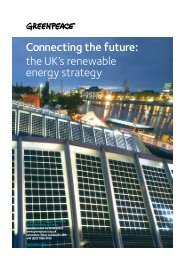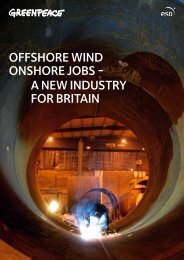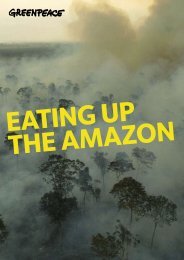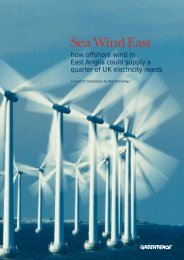How Sinar Mas is Pulping the Planet - Greenpeace
How Sinar Mas is Pulping the Planet - Greenpeace
How Sinar Mas is Pulping the Planet - Greenpeace
Create successful ePaper yourself
Turn your PDF publications into a flip-book with our unique Google optimized e-Paper software.
1<br />
executIVe SUMMAry<br />
<strong>How</strong> SINAr MAS<br />
IS PULPING<br />
<strong>the</strong> PLANet<br />
GLOBAL ActION to<br />
TACKLE CLIMAte<br />
chANGE<br />
Tropical forest destruction <strong>is</strong> responsible<br />
for around 20 per cent of global<br />
greenhouse gas (GHG) em<strong>is</strong>sions. 1 Ending<br />
deforestation will not only preserve<br />
biodiversity but it must be a central part of<br />
a global strategy to tackle climate change.<br />
Peatlands are perhaps <strong>the</strong> world’s most<br />
critical carbon stores and a key defence<br />
against climate change; <strong>the</strong>y store<br />
somewhere between a fifth and a third of<br />
<strong>the</strong> total carbon contained in <strong>the</strong> terrestrial<br />
biosphere, including all soils and<br />
vegetation. 2 There are about 22.5 million<br />
hectares of peatlands in Indonesia, 3<br />
<strong>the</strong> vast majority of which are on <strong>the</strong><br />
Indonesian <strong>is</strong>land of Sumatra. 4<br />
The destruction of rainforests and<br />
carbon-rich peatlands 5 <strong>is</strong> <strong>the</strong> key reason<br />
why Indonesia accounts for around a<br />
quarter of all GHG em<strong>is</strong>sions caused<br />
by deforestation. 6 According to recent<br />
government estimates, Indonesia ranks as<br />
<strong>the</strong> world’s third largest GHG emitter. 7 The<br />
palm oil and pulp and paper industries<br />
are two of <strong>the</strong> major drivers of <strong>the</strong>se<br />
escalating em<strong>is</strong>sions. 8<br />
The destruction of Indonesia’s forests and<br />
peatlands also has a devastating impact on<br />
biodiversity. The endangered orang-utan<br />
and <strong>the</strong> Sumatran tiger are just two of <strong>the</strong><br />
species under threat of extinction, 9 in part<br />
due to <strong>the</strong> loss of natural forest habitat. 10<br />
SINAR MAS – <strong>the</strong><br />
‘GreAT PerIL’ to<br />
YOUR BRAND<br />
Controlled by <strong>the</strong> Indonesian Widjaja<br />
family, 11 <strong>the</strong> <strong>Sinar</strong> <strong>Mas</strong> group <strong>is</strong> one of<br />
<strong>the</strong> largest conglomerates in Indonesia<br />
engaged in clearing rainforests and<br />
destroying peatlands. 12 The group also<br />
has significant interests in coal mining,<br />
amongst o<strong>the</strong>r sectors. 13<br />
According to Globe Asia magazine,<br />
<strong>the</strong> Indonesian tycoon that founded<br />
<strong>Sinar</strong> <strong>Mas</strong>, Eka Tjipta Widjaja, <strong>is</strong><br />
considered to be <strong>the</strong> second richest<br />
person in Indonesia, with a fortune<br />
worth USD 4 billion. 14<br />
<strong>Sinar</strong> <strong>Mas</strong> palm oil and paper <strong>is</strong> used in<br />
a range of products sold in stores and<br />
supermarkets around <strong>the</strong> world, from<br />
toilet paper and luxury shopping bags to<br />
chocolate bars and doughnuts. 15<br />
Between November 2007 and April<br />
2010, <strong>Greenpeace</strong> released a series<br />
of investigative reports on <strong>Sinar</strong> <strong>Mas</strong> 16<br />
and o<strong>the</strong>r key players in <strong>the</strong> Indonesian<br />
palm oil sector. They revealed that <strong>Sinar</strong><br />
<strong>Mas</strong> was expanding its operations and<br />
encroaching on Indonesia’s remaining<br />
rainforests and peatlands.<br />
As a result, a growing number of<br />
international consumer companies,<br />
including Unilever, 17 Kraft 18 and Nestlé, 19<br />
suspended multimillion dollar palm oil<br />
contracts with <strong>Sinar</strong> <strong>Mas</strong>. 20<br />
APP – coNTINUING to<br />
BUILD AN EMPIre ON<br />
OLD rhetorIC<br />
<strong>Sinar</strong> <strong>Mas</strong>’ pulp and paper div<strong>is</strong>ion, Asia<br />
Pulp and Paper (APP), <strong>is</strong> Indonesia’s<br />
largest pulp and paper producer. 21 With<br />
its expansion into China in 1992, 22 it<br />
became <strong>the</strong> fourth largest worldwide 23<br />
and, in 2008, it ranked as <strong>the</strong> world’s fifth<br />
largest t<strong>is</strong>sue producer. 24 The group has<br />
recently set up new sales networks in <strong>the</strong><br />
US, 25 <strong>the</strong> UK 26 and Spain, 27 and expanded<br />
its production capacities in Australia, 28<br />
Canada, 29 China 30 and <strong>the</strong> US. 31<br />
According to mapping analys<strong>is</strong> conducted<br />
by <strong>the</strong> World Wildlife Fund (WWF), APP’s<br />
two pulp mills in Sumatra cause more loss<br />
of rainforest than any o<strong>the</strong>r company on<br />
<strong>the</strong> <strong>is</strong>land. 32<br />
Over <strong>the</strong> last five years, APP has<br />
repeatedly claimed that it <strong>is</strong> on a<br />
responsible ‘path toward sustainability’<br />
and will soon have no need to pulp<br />
Indonesian forests to meet its fibre<br />
requirements. Written for its customers<br />
and o<strong>the</strong>r stakeholders, its ‘sustainability’<br />
reports have proclaimed:<br />
• “after th<strong>is</strong> date [2007], APP/SMG<br />
will be fully reliant on renewable,<br />
plantation-grown fibre from socially,<br />
environmentally and legally responsible<br />
sources.” 33<br />
• “<strong>the</strong> current 623,409 hectares<br />
of plantation forests will more



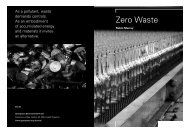
![[2007] EWHC 311 - Greenpeace UK](https://img.yumpu.com/22079793/1/184x260/2007-ewhc-311-greenpeace-uk.jpg?quality=85)
